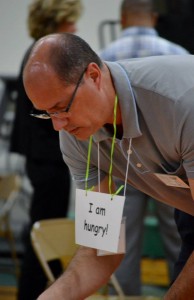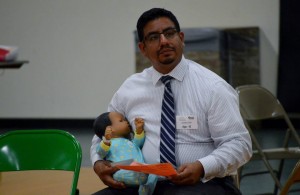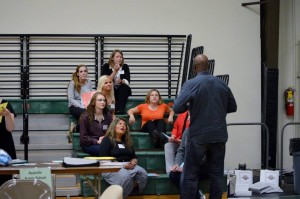
“Things can change in the blink of an eye,” said Carolyn Hansen, 4-H Youth Development Educator for McLean County. “Most families are just a paycheck away from falling into poverty.”
Hansen shared this fact with poverty simulation participants at the Lawrence Irvin Neighborhood Center in West Bloomington. She co-led the simulation with Aimee Ingall, Community Development Educator for Livingston, McLean, and Woodford Counties.
The free and open-to-the-public event is sponsored annually by the Multicultural Leadership Program (MCLP) and serves as an important learning opportunity for its program participants and the community.
The role-playing exercise educates community members about the circumstances and daily stressors facing individuals who live in poverty, and inspires participants to make a difference in the lives of their fellow citizens.
The difficulties participants experience in the simulation include securing employment and transportation, feeding their families, and communicating with others despite language barriers. These realities are common in Central Illinois communities. Hansen said the poverty rate in McLean County is almost a full percentage point higher than it is for the state of Illinois.
Participants who had never before faced these difficulties found themselves acting in ways contrary to their typical behavior during the simulation.
“I was doing things I don’t usually do—cutting people in line and stealing. I was worried about being fired and only cared about my family, no one else,” said one participant.
For some, the simulation brought back personal memories of when they lived in poverty as children or adults.
“For me, this was in a way very similar to my childhood,” said another participant. “When I was robbed in the simulation, it brought me back. I wanted to defend myself and protect my family.”

Following the experience, Hansen led a discussion designed to educate and empower perspectives. The group dispelled stereotypes about those who live in poverty, including the uncontrollable events that lead to situational and generational poverty.
In addition, the group talked about the many different types of poverty people experience that contribute to financial instability—from mental, to physical, to emotional poverty. Each of these types of poverty serves as a societal barrier that prevents individuals from accessing vital resources and relationships.
Casting a mirror on the participants, Hansen also challenged some of the decisions participants made during the simulation. One participant — whose family was in desperate need of food — returned money she found that belonged to a business.
“If you were poor, and your family was hungry — would you have given that money back?” asked Hansen.
The inquiry opened up a larger conversation about integrity, stirring one participant to speak impassionedly about the lessons he learned from his parents while growing up in poverty.
“I remind myself and my family of the integrity my parents demonstrated while I was growing up. They taught me that if ever that day comes where you are desperate, you still give that money back to that person, because there is no price you can put on what you value most,” he said.

One of the simulation’s volunteers, Mary Campbell, who serves as the co-president of Labyrinth Outreach Services to Women, built upon this point by illustrating the philanthropic generosity of those living in poverty.
“The people with the lowest income often give the highest percentage of their income to our nonprofit,” she said.
Following this discussion, Hansen ended the evening’s events with a question: “So what?”
“So what do you do now? You are each a leader and can help to impact the lives of others. What change can you make at work or home to help those in your community?
“After all,” Hansen said, “if we don’t have a loving society, we won’t get to where we need to go.”
——
For those who want to make a difference, the Bloomington-Normal community has numerous resources to assist those in need and combat hunger, homelessness, and families fighting poverty. These organizations are always in need of individuals interested in donating time and/or funds, and include Mid-Central Community Action Center, Project Oz, Providing Access to Help (PATH), UNITY Community, Home Sweet Home Mission, The Jesus House, the Boys and Girls Club, and Western Avenue Community Center, among others.